#this book is heavily based on biblical figures and lore
Note
Satan isn't a "figure of Abrahamic religion", they're seen throughout many pagan branches and was just appropriated by Christians during Christianisation. Don't come in all uneducated and insult us like that.
Paganism has always been heavily nature based since the stone age (since there's speculation of cave bear worship and the use fertility charms etc.)... satan didn't have ties to paganism till the era when Roman Catholicism was being spread throughout Europe in order to get people to convert (that's why the Greek god Pan and I think also the Celtic/Gaulish god Cernunnos were changed into a devilish baphomet figure and such)...and eventually witches began having association with satan...Lucifer/satan was first written as a figure in biblical text (in which Abrahamic religions arose in the Bronze Age at the earliest loooong after paganism/"proto-paganism" was established)...
-satan: is a fallen angel... angels=Abrahamic based figures
-beezlebub: has a Hebrew name deriving from a Phillistine god later adopted by some Abrahamic religions...(ok I'll give you this one I suppose)
-abbadon: Hebrew term found in the bible for a place of destruction and an archangel of the abyss...again archangel=Abrahamic figures
-belphegor: one of the seven princes of hell.. demons and hell=Abrahamic concepts and figures
-asmodeus: prince of demons and in Judeo-Islamic lore, the king of earthly spirits...as found in the Jewish based Book Of Tobit..
See how many more ties to Abrahamic religion your, "anti-Abrahmic" beliefs have compared to paganism?...so ya'll never really truly, fully had let go of Abrahamic beliefs in a way...this is all being said by someone who's into Norse and Celtic style paganism by the way after realizing a good chunk of my anxiety was fears brought on by my Christian background and how I was only ever really into Bible stories and that was it...after being raised Pentecostal..
0 notes
Text
SUMMARY
Thomas Dagget, a Catholic seminary student, loses his faith when he sees visions of a war between angels. Years later, Thomas is a detective with the Los Angeles Police Department. Two angels fall to Earth: Simon briefly enters Thomas’ home and warns him of coming events, while Usiel, a lieutenant of the Archangel Gabriel, is killed in an altercation with Simon. Investigating the disturbance, Thomas finds in Simon’s apartment the obituary of recently deceased Korean War veteran Colonel Arnold Hawthorne, and a thesis about angels which Thomas himself wrote in seminary. Meanwhile, in Chimney Rock, Arizona, Simon finds Hawthorne awaiting burial and sucks his soul out of his body.

The medical examiner informs Thomas that Usiel’s body has no eyes, no bones, hermaphroditism, and the blood chemistry of a fetus. His personal effects include an ancient Bible, with an expanded Book of Revelation that describes a second war in Heaven and prophecy that a “dark soul” will be found on Earth and used as a weapon.
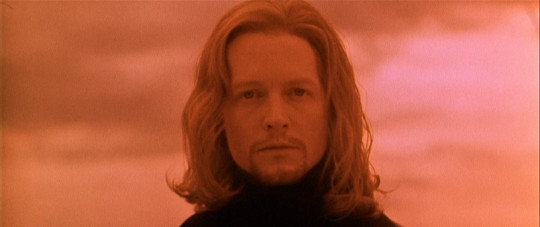
Gabriel arrives on Earth. Needing a human helper, Gabriel catches a disappointed Jerry, a suicide, in the moment of his death. Jerry retrieves Usiel’s belongings from the police station while Gabriel destroys Usiel’s body in the morgue. Finding Hawthorne’s obituary, Gabriel and Jerry head for Chimney Rock. Before Gabriel arrives, at the local reservation school Simon hides Hawthorne’s soul in a little Native American girl, Mary, who immediately falls ill and is cared for by her teacher, Katherine.

After finding Usiel’s burnt body, Thomas hurries to Chimney Rock. When Gabriel realizes Hawthorne’s soul is missing, he confronts Simon. Hawthorne’s soul will tip the balance to whichever side possesses it, and a win for the rebellious angels would make Heaven like Hell with Earth in its thrall. Gabriel tortures Simon, but he refuses to reveal its location, so Gabriel kills him. Mary shows signs of possession by Hawthorne, recounting an incident from Hawthorne’s harrowing war experiences in first-person perspective. Meanwhile, Thomas examines Simon’s remains and questions Katherine. In Hawthorne’s home, he finds evidence of war crimes. Thomas visits a church to reflect in and is shaken by a verbal confrontation with Gabriel.
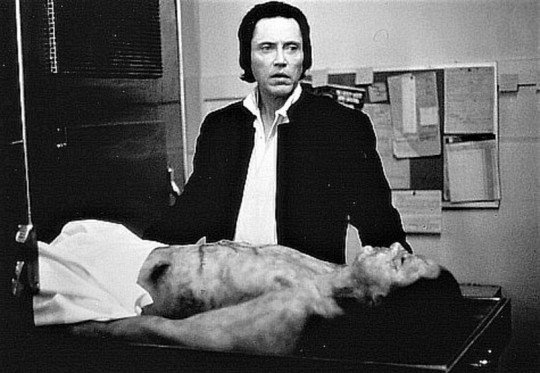
At school, Katherine finds Gabriel questioning the children. After he leaves, she rushes to Mary’s home and finds Thomas. As Mary’s condition worsens, Katherine takes Thomas to an abandoned mine where she had seen Gabriel. They find angelic script and experience together a terrible vision of the angelic war. Returning to Mary, they find Gabriel and Jerry. Thomas kills Jerry, while Katherine distracts Gabriel when her wild gunshot misses him and blows up Mary’s trailer home. They take Mary to a Native American site to be exorcised. In a hospital, Gabriel recruits a new unwilling assistant, Rachael, just as she dies of a terminal illness.
Lucifer confronts Katherine and tells her that “other angels” have taken up this war against mankind, and since then, no human souls have been able to enter Heaven. He knows Gabriel plans to use Hawthorne’s soul to overthrow the obedient angels. He also knows that if Gabriel wins the war under his influence Heaven will ultimately devolve into another Hell, which Lucifer considers “one Hell too many”. Lucifer then appears to Thomas and advises him to use Gabriel’s lack of faith against him. When Gabriel arrives and attempts to disrupt the exorcism ritual, Thomas kills Rachael, and he and Katherine fight Gabriel. Gabriel defeats them and moves to kill Katherine.
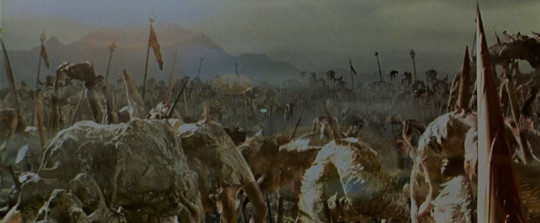
Lucifer appears, encouraging the Natives to complete the exorcism. Lucifer confronts Gabriel, telling him that his war is based upon arrogance, which is evil, making it Lucifer’s territory. Lucifer tells Gabriel he needs to go home and rips out his heart. Simultaneously Mary expels out Hawthorne’s soul. The “enemy ghost” starts to attack Thomas and Katherine, but a bright light from Heaven appears and destroys it. Lucifer asks Thomas and Katherine to “come home” with him, but they refuse. Lucifer drags Gabriel to Hell. As morning comes, Thomas comments on the nature of faith and what it means to truly be human
DEVELOPMENT/PRODUCTION
The film was shot in fall 1993. with an $8 million budget and a solid cast including Walken, Eric Stoltz and Virginia Madsen. While strange, unexplained phenomena seemed to plague the film, it was eventually finished with only a few “act of God instances and very little fundamentalist group opposition.
“I wouldn’t be surprised if we ran into some problems later.” Soisson admits. “There are so many different sects of Christianity, not to mention Islam and Judaism, and they all hold angels in different regards. The Old Testament and New Testament are completely different; the New Testament barely speaks of angels. So Christians who look to the New Testament are probably going to find the film problematic. Then again, the Old Testament describes angels as savage beings. They seek vengeance and cause bloodshed, and that’s the kind of angel we’re describing here to a certain extent. If you look at it honestly, there is a truth in the movie.
Gregory Widen
According to Widen, who wrote as well as directed, the film sprang from his fascination with the idea of what makes an angel go bad, prompted by reading Milton and studying the Bible. “I was interested in exploring that and did a lot of research with the Bible,” said Widen. I try to back up the movie as much as I can with the Bible. I’ve got a very unusual take on angels, the idea that they’re sort of God’s hitmen. If you read the Bible, they spent an awful lot of time killing first borns and turning cities to salt, especially in the Old Testament, and so the idea was to really play up that aspect of their personality.
“I thought we’d lost in our modern age the feeling that angels are anything but these fluffy things on your shoulder. There was an earlier time, a few hundred years ago, when they were seen in a much more complicated way, as creatures that were fearsome in some ways. They have free will, they’re not just an extension of God, because they obviously can rebel: they did it once before. They’re just fascinating to me as a creature, the ability to praise God all day, but with one wing dipped in blood. You’re doing God’s dirty work all the time, and you have free will, so what kind of personality does that create in a creature?”
Since the film relies heavily on historical and literary influences, many audience members unfamiliar with angelic lore might be turned off. Widen disagreed, countering, “I don’t think so. A lot of the stuff is mainly textural and will help your enjoyment of the film. And if you don’t get every single Biblical detail, I don’t think it gets in the way. If you do (get it), it’s just an added benefit.”
The film’s interpretation of angels isn’t the only potentially controversial viewpoint. While God and Jesus are mentioned, Lucifer plays a significant role at film’s end.
“Lucifer actually makes an appearance in almost a Lecterian sort of way,” said Widen, “because his basic position is that two Hells is one Hell too many. Gabriel is, in many ways, taking Lucifer’s route, from a Milton point of view.
“Unfortunately now we tend to push these things into all evil and all bad, and the Devil is just this cackling guy in a corner who was evil from moment one. Actually in the Bible and a lot of other writings, Lucifer started out as the good guy. He was the best angel, and along the way he began seeing things in a way that became incompatible with staying with God. And it was almost a heartbreaking falling out. Gabriel is doing the same thing in many ways, where he doesn’t think he’s doing anything wrong. He thinks he’s right and everybody else is wrong. He doesn’t want to be a king, he doesn’t want to rule in Heaven, he’s not trying to overthrow God. He just thinks there’s a fundamental wrong going on and everyone just sees it wrong.
“Ultimately that’s how Lucifer fell, too. He wasn’t really trying to undo God, he just disagreed. Lucifer’s a much more tragic figure in this movie. He’s more like a guy who lost the love of his life and is still a really bad guy, but is still kind of a sorrowful guy, too. But he’s there to help the humans because it’s simply not in his interests for Gabriel to win.”
The story also juxtaposes Christian mythology with aspects of Navajo mysticism. With the final battle staged on a Navajo reservation, the question of how two seemingly disparate beliefs can coexist is raised. “They weave pretty tightly,” explained Widen. “The idea is that the girl’s possessed, and the Navajo culture does have a procedure for depossessing someone. And they carry on as if that’s the issue and the two worlds meld climatically at the end, where you have an Indian exorcism and you also have Christian-based humans desperately trying to stop these angels. The idea is that they all complement each other; they’re not necessarily in opposition to each other as two concepts.
“For example, there’s a line in the movie where one guy turns to the Indian and says, “You know, this may not be a Navajo ghost,’ and the Indian says, ‘It’s all the same.’ That’s the idea. As far as they’re concerned, this is just a negative spirit inhabiting a girl.”
In eerie fashion, the production had its own run in with evil spirits while filming in Arizona. On the day filming was to occur on an Indian village set, Jones Benally, a medicine man employed as a stunt man, warned producers that two bad omens—the sighting of a coyote and an owl—had occurred and he had misgivings about continuing the production. A storm, with 120 miles-per-hour winds and lightning, subsequently blew in, destroying the set.
“We had built an Indian village on a cliff, and it blew away one night,” remembered Widen. “We had a hellacious storm. It was foretold by a medicine man because we had accidentally killed an owl with one of our trucks.”
Despite the bad omen-induced weather, the two-month production went smoothly. “I had a great time,” said Widen, who makes his feature directorial debut. “I had really great actors, which is half your job. If you have great actors, the most important thing is to just get out of the way. I definitely had Christopher Walken in mind (when I wrote this). He was the first one that signed on. Walken is an incredibly gifted actor. He gives you exactly what you want. And he has a certain ethereal quality about him that really works well with this—that otherworldly quality helps you believe he’s not quite of here. I thought that worked enormously well for him.”
The ultimate script was shaped by the concept of the seraph God’s highest order of warrior angels. Widen then centered on one particular angel, Gabriel (Christopher Walken), who wants to overthrow heaven but needs to come to Earth to snatch the black soul of a recently deceased general, which will help him strategically to win the fight.
“This was definitely a tough movie to pitch,” notes Soisson. “It’s a profound concept that makes people go ‘hmmmm,’ and they’re usually blown away when they read the script. It’s different and thought-provoking and scary, and we hope the movie will capture that. It’s one of those lucky breaks, where you’re actually trying to do justice to the script instead of trying to get a script that does justice to the production.”
Selling a studio on the idea was the hard part. After shopping it around, with Widen as a first-time director, all the team received were unnecessary criticisms one executive thought the movie was great, but didn’t understand why they needed to have the angels in it, so Widen went the independent route and ended up with an $8-million budget and considerable creative freedom. “For the film to work, it had to be done on its own terms, and I think it will work on its own terms,” Widen says. “I was afraid the studios would rub off the edges.”

Interview with Virginia Madsen
You worked with another great actor, Christopher Walken, in The Prophecy.
Virginia Madsen: Yeah, and you know, Gabriel also has a broken heart. He feels he’s been cast out by a God he deeply loves. He’s terribly jealous of humans; he feels they have replaced angels, and so Chris played that with a lot of deep, deep pain and betrayal.
He’s such an eccentric performer; what was it like acting opposite him?
Virginia Madsen: Well, fortunately, I had met him prior to the Prophecy, because we were going to do another film together that never got made. So I already knew him as this wonderful, sweet, quiet man, and suddenly he showed up with this demonic, unholy white skin and black, black hair And he was constantly eating raw garlic! To me he was normal, because I already knew him, but everyone else was scared and repulsed because of the garlic, and I know he was doing that on purpose so people would feel that way.
So he was more Method than Todd…
Virginia Madsen: Yes, but I was like, “You know, somebody has to say something.” So I said, “Chris, man, what’s with the garlic?” And he replied, “Well, Virginia, I’ve done a lot of naughty things…” “Oh, it’s a health thing?” I was like, “Yeah, sure it is.” And I said, “Well, Chris, what if we were playing a love scene between the two of us?” He said, “Well, in that case, Virginia, I would abstain.” “OK, thank you!”
You had a great cast all around in The Prophecy – Elias Koteas, Eric Stoltz, Amanda Plummer, Viggo Mortensen. It must have been very interesting to work with them all.
Virginia Madsen: Well, it was not a good experience. I mean, it wasn’t terrible, because I love my job and those guys were great, but we didn’t have much of a script. They were constantly trying to write it as we went along, and that’s terrible for actors, because all we have is the lines to say. So that was awkward, and we were trying to make it better, trying to make things make sense. We were acting our hearts out, you know what I mean? It was like, “Well, that makes no sense, but I’m gonna say it anyway! And I’m going to say it with great conviction.” We kind of felt we were treading water all the time, and Viggo came in just for a day and wrote that scene.
Lucifer’s whole “We’re open every day, even on Christmas” speech?
Virginia Madsen: Yeah; I don’t know how much he worked with the writer/director, but it was my sense that those were his words, and they were so beautiful. That was one of the extraordinary nights, because I had never met Viggo, nobody knew who he was and his work was amazing. And then Eric Stoltz came in, and he was very poetic, and everyone was intrigued by the idea of angels feeling they were not God’s favorite anymore, and how they were jealous of us because humans have souls. There was all this Biblical stuff we were discussing and trying to bring into the story, and everybody cared a lot about it.
It was also very creepy a lot of the time. There was a lot of night shooting, and the subject matter was very dark, so that feeling prevailed every day, and it kept getting darker and darker and darker. The one ray of light was Adam Goldberg, because he was so funny! I found it difficult to stay in character around him, because he was so hilarious.
Then there was a terrible storm while we were shooting up on the mesa, with the actual Native American tribe from the area we were shooting. This strange pink cloud that resembled a fist, I kid you not, came down out of the blue sky, and it looked like a big finger pointing—the finger of God-and the Native Americans left. They were like, “This is bad. You have bad mojo on the set. We can’t help you, and we’re leaving.” The director was like, “You can’t leave! We’re filming!” And they were like, “That’s a sign from God,” and they took off!
Very quickly, like it was out of hell, this massive windstorm rolled in and just blew our entire village off the top of the mountain. The trailers were blowing over, and the police were up there with a big truck trying to get us out, and then I saw this figure striding toward me it was Christopher in the wind! Trees, tumbleweeds, everything was blowing around him, and he looked so scary. I was like, “C’mon!” He was yelling something, and at first I couldn’t hear him because the wind was gale-force. And all of a sudden I realized he was saying, “Why aren’t we filming?” “Because, Chris, you’re gonna blow off the mountain! Get in the truck!” It was really scary, but he thought it was great. And you know, he was probably right. Somebody should have grabbed a camera and shot that!
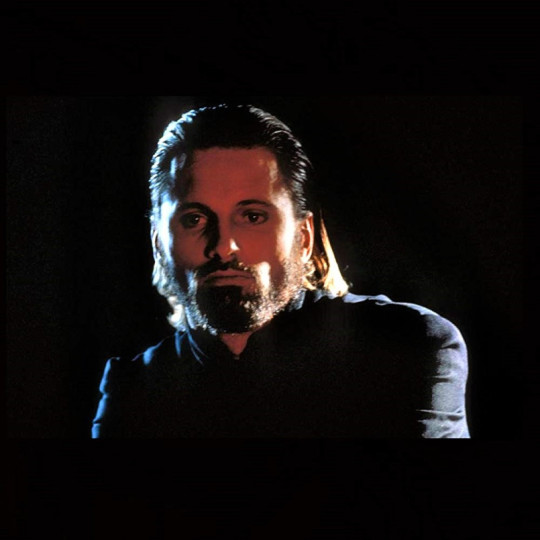
Without question, the only person who could pull off the strikingly dangerous yet sympathetic qualities of Gabriel is Walken, who was also the first to sign onto the film and whose interest was integral to getting such a comfortable budget for an independent movie by a first-time director. Naturally, of the entire crew, Walken has been the only person not affected by the rumors about Queen of Angels’ ninth floor.
“Walken ended up taking off by himself to go up there,” recalls Scott Patton, whose Patton FX (consisting of Dave Snyder, Mark Maitre, Bernhard Eichholz, Walter Phelan, Susan Lamson and Mark Villalobos) provided the special makeup FX. “He said, ‘I’ll be back, I’m going to see a ghost.’ Everyone else was freaking out, because it was 4 a.m. and he was going up there alone. Eventually he came back down and kind of chuckled to himself. Who knows what he saw? He could have seen every demon in hell running down also appears as an impaled angel in one of the movie’s visions, who has the horrible disposition one would expect from the assistant of Lucifer (Viggo Mortensen)himself.
“Being Satan’s sidekick would not be the most desirable position to have in the afterlife,” says Patton. “This character basically has no eyes and a crown of thorns on his face. It’s supposed to be a mockery of Christ wearing that crown and a symbol of blind faith, and blind faith to Satan would be a horrifying thing anyway.”

It was a movie we originally budgeted at $10 million, and we wound up with about $3 million to make it, so we had to perform a bit of triage to make it work, get everything we needed and not go over budget. I totally enjoyed Walken. He’s such a professional that when he had a couple of meltdowns on the set, because of things not being done right—which was somewhat budget-induced-each time he would very congenially ask me to walk with him around behind the trailers, just to have a little chat. Then, as soon as we were out of earshot, he would totally rip my throat out, and then say something like, “Do you understand what I’m saying?” I would say, “Yeah,” and then we would walk back and he was totally cool. Nobody ever knew I was completely shamed by him. I respect that, and I would work with him again in a heartbeat. – Joel Soisson
According to Patton, character makeups have been the effect of choice on Prophecy; among this work contributed by Patton’s crew and his key on-set prosthetic supervisor Dave Snyder are appliances for Walken and Eric Stoltz, who plays the benevolent angel Simon. However, Goldberg had the most work done on him, since he gradually decomposes throughout the course of the film.
“Adam used the makeup in ways more actors should, in the sense of using it to get into character,” says Snyder. “He would take whatever minimal discomfort there was from the makeup and totally buy into that, and blow it so out of proportion that it would be hilarious.”
“He would never ever bitch and moan to us,” Patton adds. “He would say, ‘I hate you,’ and we’d say, ‘Good, we’re making it hurt as much as we can.’ And for some reason, that would make him feel better he’d revel in the fact that he was being put through as much pain as possible.”
Neurotic and terribly funny, Goldberg, who does an eerily dead on Walken impersonation agrees that the process was a nightmare but couldn’t help but use it to his advantage. “It really helped me become the character, because I would never have had any sense how to play this guy until I put the makeup on,” the young actor says. “There’s something about looking at yourself in the mirror all made up, and actually feeling the stuff on you, that makes it quite easy to put yourself in the shoes of somebody who is decomposing.”
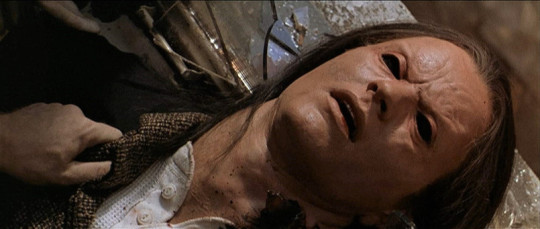
Dealing with religious iconography is always a touchy subject, and retain the film he order for secure. While there were many studio offers, the producer held out for independent financing in order for Widen to direct the film himself and also to retain the story’s impact.
“I had to walk a lot of miles, but Robbie Little of Overseas Filmgroup has been extremely supportive,” says Soisson. “He looked at it and said, ‘I love it, but I’m scared of it. I want to help you guys, but it’s going to take a while, and it did. It took almost two years, but he hung on with us. sold off some territories and gambled his own money. We cobbled together the budget and ran with it. I’m sure that if a studio had done it, we would not have been involved. It would have been made for $40 million and I’m sure they would have had some compensating values, but I’m obviously glad they didn’t make it.”
SOUNDTRACK/SCORE
The Prophecy (1995) David Williams
youtube
CAST/CREW
Directed
Gregory Widen
Produced
Joel Soisson
Written
Gregory Widen
Scott Patton … special makeup effects: Patton EFX
Martha Preciado … key makeup artist (as Martha Cecilia)
Dave Snyder … on-set prosthetics supervisor
Mark Villalobos … special makeup effects artist
Stephen Weber second makeup artist
Christopher Walken as Gabriel
Elias Koteas as Thomas Dagget
Virginia Madsen as Katherine
Eric Stoltz as Simon
Viggo Mortensen as Lucifer
Amanda Plummer as Rachael
Moriah Shining Dove Snyder as Mary
Adam Goldberg as Jerry
Steve Hytner as Joseph
J.C. Quinn as Burrows
Jeff Cadiente as Usiel
Patrick McAllister as Col. Hawthorne
Albert Nelson
CREDITS/REFERENCES/SOURCES/BIBLIOGRAPHY
Cinefantastique#27n02
Fangoria#142
Fangoria#335
Fangoria#136
The Prophecy (1995) Retrospective SUMMARY Thomas Dagget, a Catholic seminary student, loses his faith when he sees visions of a war between angels.
0 notes
Text
Christian
Jake (Mild-- prays once that we know of, wants to go to Heaven, makes no note in canon of going to church though)
Dani (Warns Jake that his new powers may be a gift from the devil and “I told ye not to trifle with them powers” since possibly satanic, makes the symbol of the cross on at least on occasion when dealing with something of possibly demonic origins)
Dr Celestus (I don’t think I need to explain this)
Possibly Christian or mixed religious beliefs
Aunt Ramona
Isabelle Bradford
Richard and Claire Bradford
Tex
Pagan/Wiccan/etc
Dr Plantagenet (Based off the figure The Green Man)
Madam Sylvia (Spiritualist/Wiccan)
Janos (Hellenic)
Liliana and Sapphire (Hellenic)
Centaurs/Minotaurs (No indication but...well, take a wild guess)
Anyone met in Valhalla in book 2 (Obvious)
Finnderool (An elf--- same reason for Gladwin below, no indication but he is a magick being)
Fionnula (Hellenic)
Possibly Pagan/Wiccan/etc
The DuVals (the Norse god Loki’s cousins)
Gladwin (A fae--- due to the sea people not being christian, I’m heavily inclined to believe that a magick being who is Christian is extremely rare and that she is pagan)
Archie Bradford (Knows a lot about Biblical lore but doesn’t hesitate in accepting that the Norse gods are real and he’s welcome in Valhalla after he dies (is even excited) and possibly talks to Odin in book 5 in a dream)
Others
Ranjit Singh (Sikh)
Waldrick (No indication of religion/possibly atheist)
Astrid (No indication of religion/possibly atheist or agnostic, though I’m also considering the possibility of her being a Heathen)
Aleeyah (No indication-- although she, herself, is a djinni)
Jacob and Elizabeth Everton (they’re “dead” --- no , I won’t elaborate on why it’s in quotation marks but trust me)
0 notes